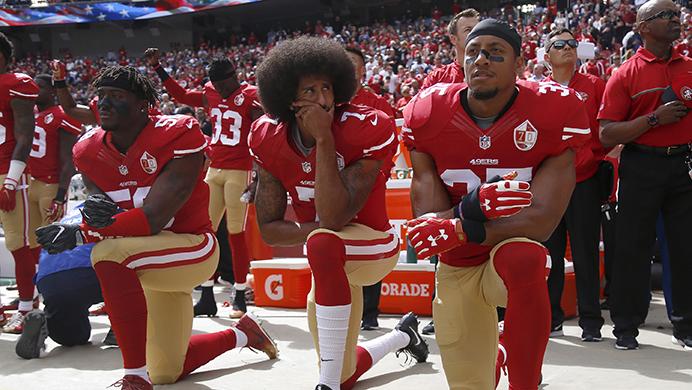Kid Rock made national headlines last week over a comment he made while performing at the Iowa State Fair. During the bridge of “Born Free,” the singer said, “Football’s about ready to start … You know what? [expletive] Colin Kaepernick.”
Last year, former 49er quarterback Kaepernick attracted national attention when he refused to stand during the national anthem at games. In a postgame interview, he defended himself to reporters, stating, “I am not going to stand up to show pride in a flag for a country that oppresses black people and people of color. To me, this is bigger than football, and it would be selfish on my part to look the other way. There are bodies in the street, and people getting paid leave and getting away with murder,” referring to a series of police shootings and court decisions that many activists have deemed unjust.
What followed was a media firestorm — conservative commentator Tomi Lahren called Kaepernick a “whiny, indulgent, attention-seeking cry baby.” Ben Shapiro, the editor-in-chief of The Daily Wire, dismissed Kaepernick’s refusal to stand as a publicity stunt to “save his failing career.” Some supporters of Kaepernick have even gone so far as to compare him to Muhammad Ali and declare him as “a hero we didn’t know we needed.”
It’s safe to say opinions on Colin Kaepernick are pretty polarized; patriotism can take many forms, and most people are rather set in their beliefs about which forms are the most virtuous. Generally, the U.S. values its symbolism and patriotism far more than many other countries. Whether the two are mutually exclusive continues to be a matter of discussion — and while these philosophical questions about if love of country must be without criticism or within the walls of nationalist traditions are intriguing and revealing of a deeper truth, they’re not representative of the conversations Kaepernick intended on fostering when he chose to take a knee. It wasn’t about him. The fact that celebrities’ opinions about him and the merits of his dwindling football career are still making headlines shows us that our country just doesn’t get it. Our society has decided that a private organization’s employment of a
person based on his protest of institutionalized racism is more important than the real people that person decided to stand up (or sit down) for.
Kaepernick is an average quarterback at best. Even if he was outstanding and the NFL blackballed him for his silent protests, the league wouldn’t be doing anything technically wrong. Decisions on a moral high ground are hard to expect from an organization that lets accusations of sexual harassment by one of their players go unaddressed. That’s not to say the controversy Kaepernick created has nothing to do with his lack of employment — on the contrary, his subpar performance is not enough to make up for that distraction. According to statistics from the NFL, his pass completion rate is 59.1 percent, ranking him in the bottom five of the league. He’s 3-16 as a starter. Kaepernick may be better than some quarterbacks who have been drafted this year, but coupled with the fact he’s bad for ratings, his stats aren’t compelling enough for his lack of employment to be
infuriating.



